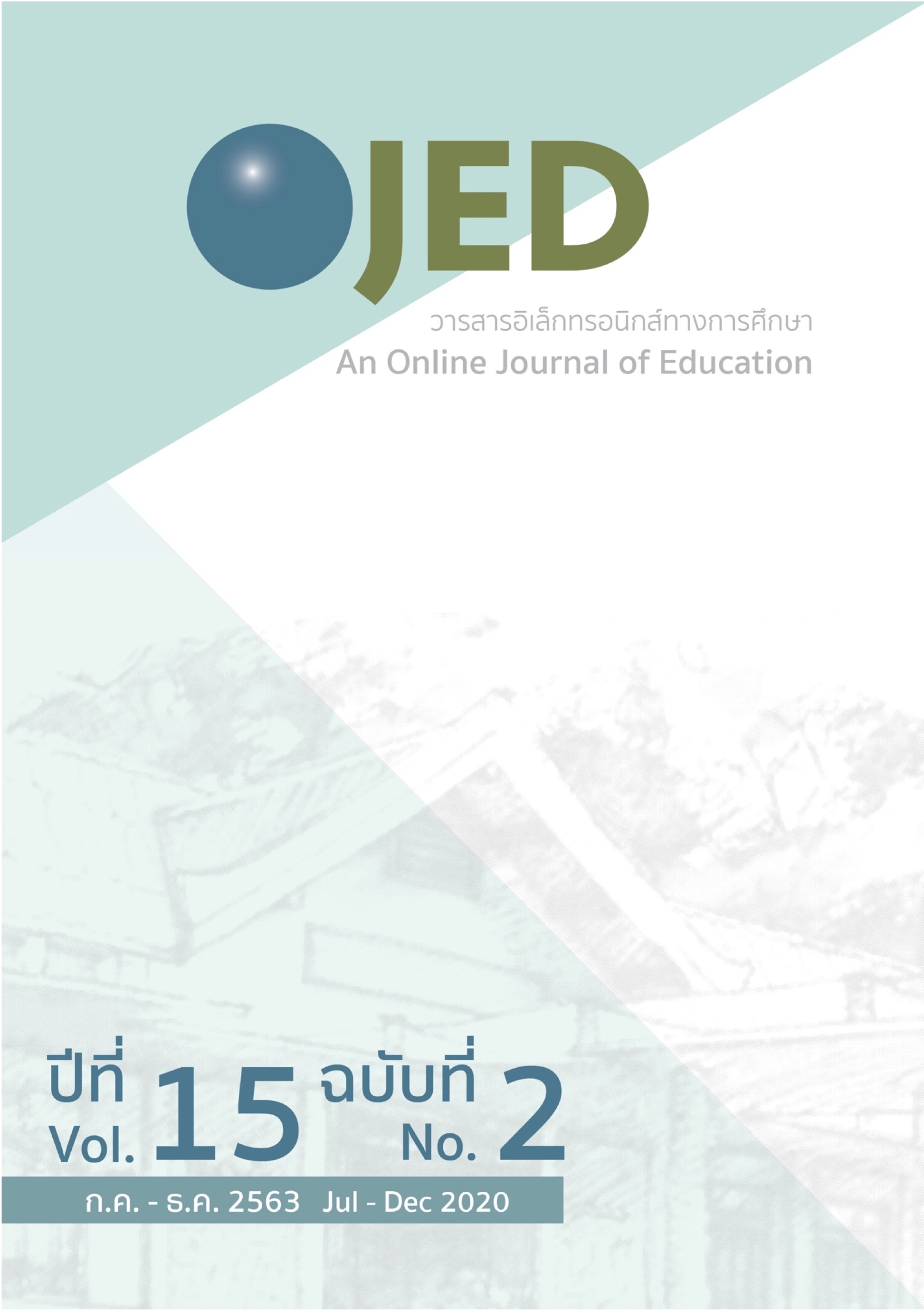A Needs Assessment of Academic Administration of Elementary School under Bangkok Primary Education Service Area Office based on the Accept of Students’ Creative Thinking Skills
DOI:
https://doi.org/10.14456/ojed.2020.21Keywords:
needs, academic administration, creative thinking skillsAbstract
The purpose of this research is to assess the current and desirable states and the needs of academic administration of elementary schools under the Bangkok Primary Education Service Area Office based on the creative thinking skills of students by using the concept of academic administration framework. This is a descriptive research that includes a case study of an elementary school under the Bangkok Primary Education Service Area Office. The research instrument used in this study was a rating scaled questionnaire. The data were analyzed by frequency distribution, percentage, mean, standard deviation and PNImodified. The informants were 65 administrators and teachers from an elementary school underthe Bangkok Primary Education Service Area Office and a group of Rattanakosin Schools.
The findings showed that the overall present state of academic administration of the elementary school under Bangkok Primary Education Service Area Office based on creative thinking skills of students was at the medium level (M = 2.938) and the desirable state was at the highest level (M = 4.740) The highest priority was evaluation (PNImodified = 0.706). The second highest priority was curriculum management and development (PNImodified =0.630) The findings based on the needs and priorities for elementary schools under Bangkok Primary Education Service Area Office may be used to help design guidelines to develop projects to improve creative thinking ability.
References
เกรียงศักดิ์ เจริญวงศ์ศักดิ์. (2553). ความคิดเชิงสร้างสรรค์. ซักเซสมีเดีย.
กระทรวงศึกษาธิการ. (2552). คู่มือการปฏิบัติงานข้าราชการครู. โรงพิมพ์ชุมนุมสหกรณ์การเกษตรแห่งประเทศไทย.
กมล ภู่ประสริฐ. (2554). การบริหารงานวิชาการในสถานศึกษา. ทิปส์พับบลิเคชั่น.
กิติมา ปรีดีดิลก. (2532). การบริหารและการนิเทศการศึกษาเบื้องต้น. อักษรพิทักษ์.
ชลาธิป ชาญชัยฤกษ์. (2558). Think outside the box. สถาบันภาษา จุฬาลงกรณ์มหาวิทยาลัย. http://www.culi.chula.ac.th/salc/images/Eng%20today/Eng.-57%20_Think%20outside%20the%20box.pdf
นิลวรรณ วัฒนา (2556). การศึกษาสภาพการบริหารงานวิชาการในโรงเรียนประถมศึกษาขนาดเล็กสังกัดสำนักงานเขตพื้นที่การศึกษาประถมศึกษาจังหวัดชลบุรี [สารนิพนธ์ปริญญามหาบัณฑิต ไม่ได้ตีพิมพ์]. มหาวิทยาลัยศรีนครินทรวิโรฒ.
เบญจพร อยู่เจริญ. (2551). การศึกษาความสัมพันธ์ระหว่างปัจจัยสภาพแวดล้อมทางการเรียนและปัจจัยส่วนบุคคลกับความคิดสร้างสรรค์ทางวิทยาศาสตร์ ของนักเรียนชั้นประถมศึกษาปีที่ 6 โรงเรียนสังกัดกรุงเทพมหานคร กลุ่มบูรพา [วิทยานิพนธ์ปริญญามหาบัณฑิต ไม่ได้ตีพิมพ์]. มหาวิทยาลัยศรีนครินทรวิโรฒ.
ปรียาพร วงศ์อนุตรโรจน์. (2553). การบริหารงานวิชาการ. ศูนย์สื่อเสริมกรุงเทพฯ.
เมธวิน ปิติพรวิวัฒน์. (2561, 27 มิถุนายน). 21st-century skill: ทักษะแห่งศตวรรษที่ 21. http://medium.com/base-the-business-playhouse/21st-century-skill-ทักษะแห่งศตวรรษที่-21-898985d417ce
ระภา เอี่ยมสุธี (2557). การพัฒนากิจกรรมการจัดประสบการณ์การเรียนรู้โดยการเล่านิทานประกอบงานศิลปะที่ส่งเสริมความความคิดสร้างสรรค์ของเด็กปฐมวัย [สารนิพนธ์ปริญญามหาบัณฑิต].มหาวิทยาลัยศรีนครินทรวิโรฒ.
วิจารณ์ พานิช. (2555). วิถีการสร้างการเรียนรู้เพื่อศิษย์ในศตวรรษที่ 21. ตถาตา.
วิจารณ์ พานิช. (2558). การประชุมวิชาการระดับนานาชาติ เรื่อง การประเมินพัฒนาการด้านกระบวนการคิดวิเคราะห์สร้างสรรค์. สำนักงานส่งเสริมสังคมแห่งการเรียนรู้และคุณภาพเยาวชน. http://www.qlf.or.th/Home/Contents/1027.
วสันต์ สุทธาวาส. (2060, 18 มกราคม). การวัดความคิดสร้างสรรค์ในเด็ก. http://www.edsiam.com/ความคิดสร้างสรรค์/
สถาบันส่งเสริมการสอนวิทยาศาสตร์และเทคโนโลยี (สสวท). (2553). รูปแบบการสอนที่พัฒนากระบวนการคิดระดับสูงวิชาวิทยาศาสตร์. โรงพิมพ์คุรุสภา.
สมพร หลิมเจริญ. (2552). การพัฒนาหลักสูตรเสริมเพื่อส่งเสริมความคิดสร้างสรรค์สำหรับนักเรียนช่วงชั้นที่ 2 [วิทยานิพนธ์ปริญญาดุษฎีบัณฑิต ไม่ได้ตีพิมพ์]. มหาวิทยาลัยศรีนครินทรวิโรฒ.
สุวิมล ว่องวาณิช. (2558). การวิจัยประเมินความต้องการจำเป็น (พิมพ์ครั้งที่ 3). จุฬาลงกรณ์มหาวิทยาลัย.
สำนักงานเขตพื้นที่การศึกษาประถมศึกษากรุงเทพมหานคร. (2562). รายงานผลการดำเนินงานประจำปีงบประมาณ 2562. สำนักงานเขตพื้นที่การศึกษาประถมศึกษากรุงเทพมหานคร.
สำนักงานคณะกรรมการการศึกษาขั้นพื้นฐาน กระทรวงศึกษาธิการ. (2551). หลักสูตรแกนกลางการศึกษาขั้นพื้นฐานพุทธศักราช 2551. โรงพิมพ์ชุมนุมสหกรณ์การเกษตรแห่งประเทศไทย.
Barbot, B., Besançon, M., & Lubart, T. I (2011). Assessing creativity in the classroom. The Open Education Journal, 4(1). 48-56. http://dx.doi.org/10.2174/1874920801104010058
Conbach, L. J. (1984). Essential of psychology and education. McGraw Hill.
Davis, G. A. (2003). Identifying creative students, teaching for creative growth. In N.
Conlangelo & G. A. Davis (Eds.), Handbook of gifted education (pp. 311–324). Pearson Education.
Fisher, R., & Williams, M. (Eds.). (2004). Unlocking creativity: Teaching across the curriculum. Routledge.
Guilford, J.P. (1967). The nature of human intelligence. McGraw Hill.
Jellen, H.G., & Urban, K.K. (1986). Assessing creative potential via drawing production: The test for creative Thinking-Drawing Production (TCT-DP). In A.J. Cropley, K.K. Urban, H. Wagner & W. Wieczerkowski (Eds.), Giftedness: A continuing worldwide challenge (pp. 163–169). Trillium.
Krejcie, R. V. & Morgan, D. W. (1970). Determining sample size for research activities. Education and Psychological Measurement, 30(3), 607-610.
Torrance, E. P. (1964). The Minnesota studies of creative thinking. In C. W. Taylor (Ed.), Widening horizons in creative (pp. 125-144). JohnWiley & Sons.
Downloads
Published
How to Cite
Issue
Section
License
Copyright (c) 2020 An Online Journal of Education

This work is licensed under a Creative Commons Attribution-NonCommercial-NoDerivatives 4.0 International License.




